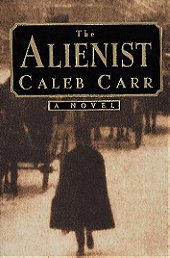The story is told from the first-person perspective, that being from John Schuyler Moore, a writer for the New York Times. It takes place in 1896 in Manhattan. Two close friends of Moore’s, back from their college days, are alienist Laszlo Kreizler (alienist was a term used at the time for one that treated those with mental illnesses) and the head of the New York City Police Board of Commissioners Theodore Roosevelt (yes, the real Teddy Roosevelt). As the story begins, Roosevelt calls Kreizler and Moore together to do an investigation, though obviously not official, of a recent murder of a boy-whore, though it appears that two others cases before are also connected. Roosevelt is in the middle of a shake-up with the New York PD, having fired the chief of police and many long-time cops that were loyal to the former, while hiring new ones. At the time too, there were many murders that would not only go unsolved, but would not even be investigated, usually due to those involved (like whores and the poor). But the sheer grizzly manner that these boys have been murdered, and Roosevelt’s desire to what must be done, he can’t just let things go. He enlists the help of brothers Lucius and Marcus Isaacson, both detective sergeants on the force and loyal to Roosevelt, and Sara Howard who is Roosevelt’s secretary but hoping to pursue a career in criminal investigation.
There are many famous people of the time that are characters, though in small roles, in the book (J. P. Morgan, Jacob Riis, Lincoln Steffens, Monk Eastman, Anthony Comstock, Thomas Byrnes, Archbishop Michael Corrigan, James T. “Biff” Ellison, Paul Kelly, Franz Boas, and Clark Wissler). Also, Jesse Pomeroy who committed some grizzly murders as a 16 year old is also a character, which helps the investigation, though he is “re-located” by Carr to Sing Sing prison, when in fact he was imprisoned in Massachusetts. For the staunch criminal fan, this may frowned upon. For those like me that didn’t know better and had to look it up, I found it interesting, because it really added to the story.
Carr is a historian, and it seems obvious to me that he knows his stuff. His writing was confident, like he knew the surrounding territory like the back of his hand. Sure, he grew up on the Lower East Side, where most of the story takes place. But certainly not in 1896. His writing style also added so much to the story. He used foreshadowing quite often at the end of the chapter, and it wasn’t always known where you would need that bit of information. Sometimes the thoughts were continues the in the first lines of the next chapter. Sometimes it was half a book away.
He drew strong characters. All five were very realistic. They had flaws. They didn’t always understand each other’s information. Sometimes it was a fight to get all five people on the same page (no pun intended). And through out the book, the characters stayed strong. One chapter, after obtaining a note that the killer had sent to a victims mother, the five sit down and discuss all it means. It was a real headspinner. Not only does Carr give you a huge amount of great information that is concise and very in depth, he also gives it to you in a way that you can understand, and presented through the characters that doesn’t seemed like a forced information dump, and still manages to keep all the characters in character. Amazing! His fleshing out of those famous men that he brought in was very good, especially Roosevelt who played the biggest part of those.
I also think Carr did a great job in bringing in those “politics” of the time and area. The corruption surrounding the PD, the way certain “businessmen” conducted their business, and the way that some were only looking out for themselves, not caring who committed the murders, but what hoe is effected them. It gave me great insight to the time and the happenings of that era.
Another point I liked about this story was not knowing a thing about the killer and watching the characters try to put it all together. None of it came across as “writer magic”: having a great idea for a story, but not knowing how to properly put it all together so it doesn’t seem forced. Though you didn’t get to see into the mind of the killer on a personal level, you still got to know more about them at the same pace as the characters did. It made for great reading.
The book is part mystery, without really being a full fledged mystery, in my opinion. It is part horror, without really being a horror story (though it was nominated for the Bram Stoker Award that usually signifies a horror-type story). And it is also part historical fiction. With all three working in the best possible terms, it turned out to be a fantastic book.
8/10
 Login
Login